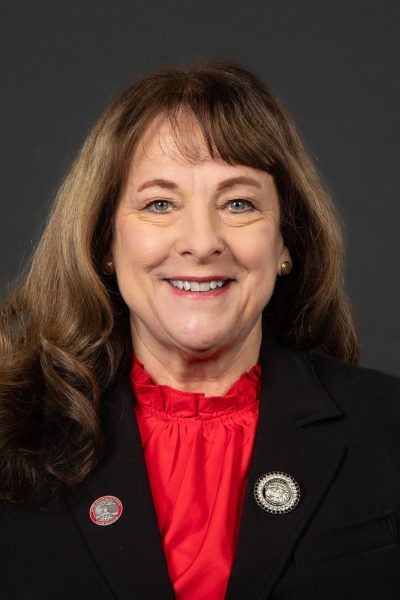State Senator Sweeney talks fiscal responsibility at legislative coffee event
Scarlet & Black 2025-04-21
On Saturday, April 12, Iowa State Senator Annette Sweeney (R – Iowa Falls) held her final Legislative Coffee event at Drake Community Library, hosted by the Grinnell-Jasper League of Women Voters and the Grinnell Chamber of Commerce. Sweeney answered questions from community members regarding health insurance coverage, transgender civil rights, diversity, equity and inclusion (DEI), the impact of tariffs on farmers, climate change resilience measures and more.
Terese Grant of the Grinnell-Jasper League of Women Voters served as the moderator, reading pre-submitted questions and collecting questions in real time from attendees.
“I have found my coming down to Grinnell very positive,” said Sweeney. “This is a true listening post, and sometimes we agree to disagree, but you always give different insights. If we don’t have those different insights, laws don’t change.”
The first question presented concerned Senate File 615, passed by the Iowa Senate in a 33-15 vote and amended to require people to work at least 80 hours each month to continue receiving Iowa Health and Wellness Plan (IHAWP) Medicaid coverage. The Legislative Service Agency estimates that 32,000 Iowans will lose Medicaid coverage with the implementation of the 80-hour work requirement.
Sweeney expressed support for the bill, stating that individuals must meet the criteria to receive services. “The state wants to make sure that the individuals that are on Medicaid need to be on Medicaid,” Sweeney said.
 State Senator Annette Sweeney (R – Iowa Falls) poses for a portrait (Contributed by Terese Grant).
State Senator Annette Sweeney (R – Iowa Falls) poses for a portrait (Contributed by Terese Grant).One question addressed House File 583, which removed gender identity from the Iowa Civil Rights Act, effectively removing anti-discrimination protections for trans people from state law. The submission asked why the approach was to take away trans civil rights instead of making spaces more private for individuals.
Sweeney said, “We all have rights as human beings under the Civil Rights Act — with that, if a person is transgender, they still have rights as a non-transgender person.”
Senate File 538 prohibits Iowa doctors from providing gender affirming care to transgender people under the age of 18. Another attendee followed up on an email they had sent outlining how Sweeney’s justification for this legislation is not representative of the larger picture of what is happening, saying that the regret rates for people who transition surgically are much lower than, say, those who have elective cosmetic procedures.
“The surgeries, the puberty blockers, I’m standing firm should not happen before people are 18. The surgeries that individuals elect to do after those years is their decision,” Sweeney said.
On the matter of the Iowa Senate passing Senate File 507, a bill that would prohibit diversity, equity, and inclusion (DEI) offices or staff in Iowa city governments, an attendee asked if diversity is something that helps or hurts Iowa.
“Diversity, equity and inclusion, especially in our rural areas, puts up a little bit of a barrier for us in order to get the best person for the job,” said Sweeney.
Later in the talk, an attendee followed up, asking why in so many areas, businesses and government, the best person for the job turns out to be a white guy, earning a few chuckles from the audience.
Sweeney said, “I didn’t suggest that DEI promotes less qualified people. It’s just that with the policies we have, especially in our rural areas, we just need to get the best person for the job, and we don’t have to check boxes because a lot of times in our rural areas, we don’t have boxes to check.”
On the topic of the impact of the Trump administration’s tariffs, Sweeney voiced firm disapproval of the potential negative impact of tariffs on Iowa farmers.
“I would like to send a message to the President and say, please, look at history. Look at how much agriculture is the heartbeat of the United States,” Sweeney said. “Having tariffs coming in or tariffs going out, we need to make sure that we move our grain and to keep our economy going well — we also have to remember, let’s not lose the markets to Brazil.”
One attendee said that whether or not the federal administration agrees, climate change is a reality in Iowa, and asked Sweeney what the state legislature has been doing to make Iowa more resilient in the face of an increasing number of extreme weather events.
First, Sweeney praised the efforts small towns are making to ensure tornado sirens are updated, and farmers implementing saturated buffers, buffer strips and waterways for flood mitigation.
Sweeney said that looking at different infrastructure for housing, like roofs and windows, is important in preparation for these kinds of events. “As for Iowa becoming more resilient, we need to be able to plan,” she said.
One individual expressed concerns over approving tax cuts when anticipated revenues don’t meet current budget, and asked how legislators are practicing fiscal responsibility. Sweeney said that the state of Iowa has in code that they cannot spend more than 99 percent of what they take in. While the final budget has not been passed, with the proposed budget, the state is at 97.8 percent spending of revenues coming in.
“I look at our tax cuts, which are helping Iowans put more money into their pockets. I don’t look at that as so dismal, and with the development of taking down barriers for businesses to be able to start in our state, we give them tax incentives,” said Sweeney.
The event generated a variety of questions and gave Sweeney an opportunity to address the Grinnell community’s top legislative concerns. Representative Dean Fisher (R – Montour), who represents Grinnell, declined to attend the March 22 and April 12 Legislative Coffees. The 2025 legislative session is set to adjourn on or before May 2 (Day 110).